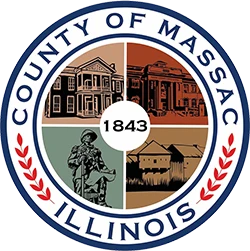Massac County Commissioners
Welcome
The role of a county commission in local government have several key responsibilities:
- Legislative Functions: County commissions often serve as the legislative body for the county, responsible for enacting local ordinances and regulations. These ordinances can cover a wide range of issues, including zoning, land use, public safety, and taxation.
- Budgetary Authority: County commissions typically have the authority to adopt an annual budget for the county government. This involves setting priorities for spending, allocating funds to different departments and programs, and ensuring that the budget is balanced.
- Policy Making: County commissions play a role in setting overall policy direction for the county government. This can involve establishing goals and objectives, adopting long-term plans and strategies, and making decisions on major issues affecting the county.
- Appointment and Oversight: County commissions often have the authority to appoint department heads, boards, and commissions responsible for various aspects of county government. They may also oversee the activities of these entities to ensure they are operating effectively and in accordance with established policies and procedures.
- Infrastructure and Services: County commissions are typically responsible for providing or overseeing a variety of public services and infrastructure, including roads and transportation, parks and recreation, public health, and social services. They may directly operate some of these services or contract them out to other entities.
- Representation and Advocacy: County commissioners serve as representatives of their constituents, advocating for their interests and concerns at the county level. They may also work to coordinate with other local governments, state agencies, and regional organizations to address common issues and pursue shared goals.
Overall, county commissions play a critical role in the governance and administration of counties, working to meet the needs of residents, promote economic development, and enhance the quality of life within their jurisdictions.
Massac County Commissioners
Jayson Farmer– Chairman
Jeff Brugger- Vice Chairman
Jimmy Burnham– Secretary
Meeting Dates
Next Meeting’s Agenda
Past Meeting Minutes
Download Past Meeting Minutes
December 1, 2025
November 24, 2025
November 20, 2025-Public Meeting
November 10, 2025
November 6, 2025-Special Meeting
October 28, 2025
October 14, 2025
September 30, 2025
September 16, 2025
September 2, 2025
August 26, 2025-Special Meeting
August 19, 2025
August 5, 2025
July 22, 2025
July 11, 2025 Special Meeting
July 8, 2025
June 24, 2025
June 10, 2025
May 27, 2025
May 13, 2025
Special Meeting-May 6, 2025
April 29, 2025
April 15, 2025
April 2, 2025
Special Meeting-March 21, 2025
March 18, 2025
March 4, 2025
Special Meeting-February 24, 2025
February 18, 2025
February 4, 2025
January 28, 2025
January 7, 2025
Special Meeting-December 31, 2024
December 23, 2024
December 18, 2024
Special Meeting December 5, 2024
December 10, 2024
November 26, 2024
November 12,2024
Special Meeting November 7, 2024
October 29, 2024
October 15, 2024
October 1, 2024
September 25, 2024
September 17, 2024
August 20,2024
August 6, 2024
July 23, 2024July 9, 2024
July 1, 2024 Special Meeting
June 25, 2024
June 20, 2024 Special Meeting
June 11, 2024 Meeting
May 28, 2024 Meeting
May 14, 2024 Meeting
May 7, Meeting2024 Special
April 30, 2024 Meeting
April 16, 2024 Meeting
April 9, 2024 Meeting
